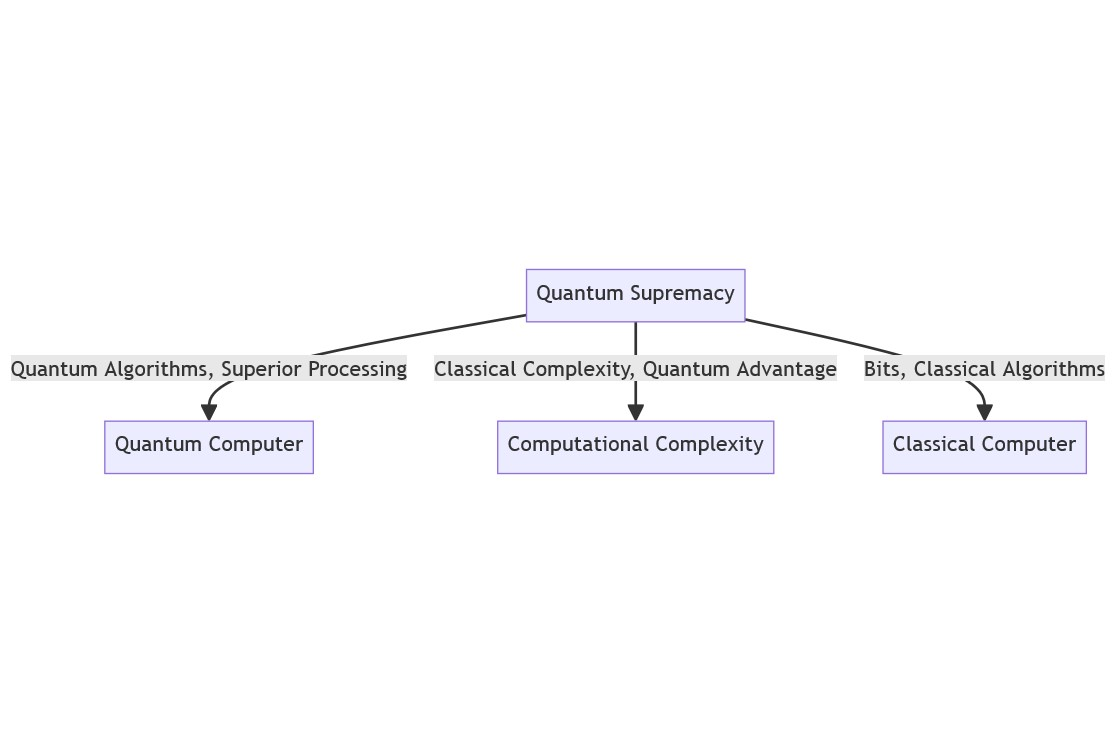By: Aiyaan Hasan, International Center for AI and Cyber Security Research and Innovations (CCRI), Asia University, Taiwan, rayhasan114@gmail.com
Abstract:
In the field of computing, quantum supremacy—the point at which a quantum computer outperforms its classical counterparts in tackling a particular problem—represents a revolutionary turning point. The idea of quantum supremacy is examined in this article along with its importance and its effects on several sectors. We explore the fundamental ideas and the race to get there. We discover that quantum supremacy involves redefining the possibilities of computation rather than just achieving quicker calculations as we traverse the quantum world.
Introduction:
The limits of computing technology are rapidly increasing, marking an exciting turning point in the field. This shift is centered around the idea of “quantum supremacy.”[1] The point at which a quantum computer can complete a task faster than classical computers in a reasonable amount of time is known as quantum supremacy. It could transform many different sectors and scientific fields and marks an important turning point in the development of quantum computing.
Quantum Supremacy: Redefining Computational Limits
Quantum supremacy represents a significant change in how we approach problem-solving, not just an increase in processing capability. This development is based on the special qualities of quantum bits, or qubits, which are able to exist in several states at once because of a phenomenon called superposition.[2] Qubits can also be entangled, which means that even when separated by great distances, the states of two qubits have no separation. These features make quantum computers incredibly well-suited for particular jobs since they enable them to investigate numerous potential solutions to a problem at once.[3]

The Quantum Race: A Challenge and an Opportunity
There is a race to show off the capabilities of quantum computing in both academics and technology companies: achieving quantum dominance.[4] With its 53-qubit Sycamore quantum processor, Google claimed to have achieved quantum supremacy in 2019, making headlines by completing a calculation that would have taken thousands of years for traditional supercomputers to complete in just 200 seconds. IBM, however, questioned the extent and importance of Google’s accomplishment.
Consequences of Quantum Domination
- Cryptography: The effect of quantum supremacy on encryption is one of its most important consequences. Large numbers can be factored efficiently by quantum computers, which could undermine popular encryption techniques like RSA and ECC. As a result, post-quantum cryptography—which is immune to quantum attacks—was developed.
- Optimization: Complex optimization issues are common in domains like materials science, economics, and logistics, and quantum computers are particularly good at addressing them. Applications include logistics businesses’ route optimization and the banking industry’s portfolio optimization.
- Drug Discovery: The more realistic simulation of molecular and atomic activity by quantum computers may speed up the process of finding new drugs. This might result in the creation of novel medications and treatments considerably more quickly.
Conclusion:
One of the most important developments in the field of computing is the search for quantum supremacy. Beyond only computing power, quantum supremacy brings in a new era of research and problem-solving. Along with the obligation to solve the security risks it presents to encryption; it also carries the potential to transform optimization and scientific research.
Quantum computers will have a big impact on how science and technology develop in the future. Not only does quantum supremacy mark the end of the story of computation, but it also marks the beginning of a new one. The race is on, and as long as we keep pushing the envelope of what is possible in the field of quantum computing, the possibilities are endless.
References:
- Arute, F., Arya, K., Babbush, R., Bacon, D., Bardin, J. C., Barends, R., … & Martinis, J. M. (2019). Quantum supremacy using a programmable superconducting processor. Nature, 574(7779), 505-510.
- Lund, A. P., Bremner, M. J., & Ralph, T. C. (2017). Quantum sampling problems, BosonSampling and quantum supremacy. npj Quantum Information, 3(1), 15.
- Terhal, B. M. (2018). Quantum supremacy, here we come. Nature Physics, 14(6), 530-531.
- Gibney, E. (2020). Quantum computer race intensifies as alternative technology gains steam. Nature, 587(7834), 342-344.
- Xu, Z., He, D., Vijayakumar, P., Gupta, B., & Shen, J. (2021). Certificateless public auditing scheme with data privacy and dynamics in group user model of cloud-assisted medical WSNs. IEEE Journal of Biomedical and Health Informatics.
- Liu, R. W., Guo, Y., Lu, Y., Chui, K. T., & Gupta, B. B. (2022). Deep network-enabled haze visibility enhancement for visual IoT-driven intelligent transportation systems. IEEE Transactions on Industrial Informatics, 19(2), 1581-1591.
- Zhou, Z., Li, Y., Li, J., Yu, K., Kou, G., Wang, M., & Gupta, B. B. (2022). Gan-siamese network for cross-domain vehicle re-identification in intelligent transport systems. IEEE Transactions on Network Science and Engineering.
- Zhang, Q., Guo, Z., Zhu, Y., Vijayakumar, P., Castiglione, A., & Gupta, B. B. (2023). A deep learning-based fast fake news detection model for cyber-physical social services. Pattern Recognition Letters, 168, 31-38.
Cite As
Hasan A. (2023) Unlocking Quantum Supremacy: A Leap Forward in Computing, Insights2Techinfo, pp.1